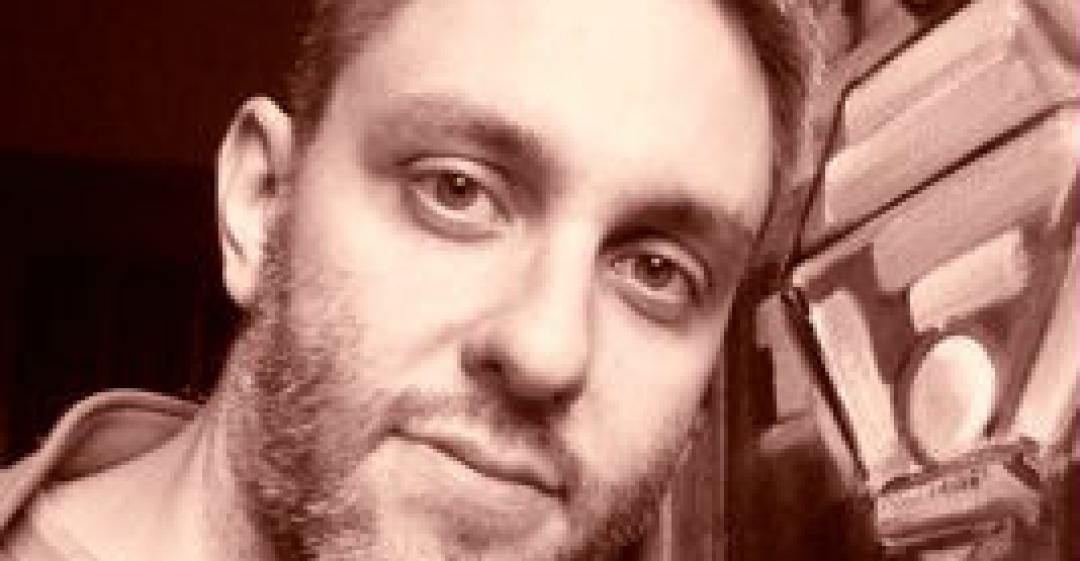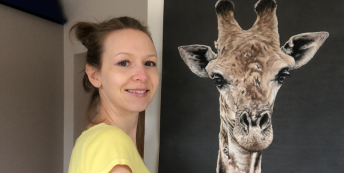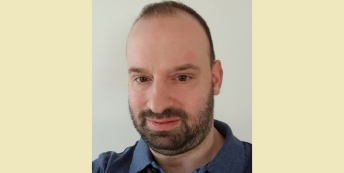“I ended up in a field that was fascinating, but not exactly what I wanted to do in my life.”

What was your role in your old job?
I was a graduate research assistant while enrolled as a Ph.D. student, carrying out research on galaxies and their evolution. I collected data on galaxies, carried out my own observations with telescopes, analysed data, wrote scientific papers on my discoveries, and taught astronomy courses at Columbia University.
What is your new role?
I'm now a visual artist working with painting, photography, video and narrative. I have exhibited around the world in galleries, institutions, and museums. Recently I also started writing about my career shift and published a short, humorous memoir on it: "The Cosmic Sucker".
Why did you change?
There were many factors at play. First of all I grew more and more dissatisfied with the way scientific research is done these days. It is no longer the endeavor of a single person or a small group of scientists working together to explain something, it's all big collaborations where everyone has a chunk of work to do, like in corporations or factories. Working solo on your ideas has become almost impossible and I'm not good at working in large teams. The other factor was that, as a scientist, you have very little control over your life: you keep moving around the world wherever you find a position for a few years. It's something that you don't fully realise until you start looking for jobs. I have friends who have moved to three different continents and still haven't been able to settle down! I like to decide where I want to live and for how long. However, I think the deciding factor was that I felt I betrayed my childhood dream by working in science. Somehow I felt I took a wrong turn at a certain point and ended up in a field that was fascinating, but not exactly what I wanted to do in my life.
Are you happy with the change?
Yes. I haven't thought about going back to my old career for a single minute.
What do you miss and what don't you miss?
I enjoyed doing research and I had a lot of ideas to work on, but since I changed career I've totally enjoyed putting my creativity to work in the arts. Sometimes I miss the security of having a pay cheque coming in every month, no matter what. I also miss using my maths and physics skills. It was fun to do all those calculations trying to solve a problem.
I certainly don't miss the frustration of working with computer codes fifteen hours a day in a tiny office, the lonely days at a telescope in the middle of nowhere, or the boring congresses with people endlessly talking about stuff no one else understood.
How did you go about making the change?
It was a funny coincidence that a fellow graduate student wanted to take some art classes just for fun. So, I started researching places that allowed part-time artistic studies. At a party in New York I met a girl who was taking night classes at the Art Students League, one of the most prestigious art schools in America where many of the big names studied - Pollock, Rothko, Rauschenberg, Bourgeois among the others. She recommended I try it, so I did. I enrolled in a night class with famous painter Robert Cenedella. It was great because there were no lectures. It was hands-on, independent study with the supervision of an established artist. I liked that a lot. As soon as I had a brush in my hand I knew it was what I wanted to do for the rest of my life.
Later that year I added another class with another famous American painter, Mary Beth McKenzie, where I studied painting from life, mostly nude models. After a couple of years I set off on my own. I did a lot of experimental work in a tiny studio where I also lived. I set up my own website (www.reviglio.com). Then I started contacting galleries, critics, curators... little by little I found people interested in my work, I was invited to exhibit my paintings, photographs and videos. I became part of the art world.
How did you handle your finances to make your change possible?
I relied on savings until I was earning enough from my art to support me. It's really hard to keep a steady part time job as an artist, because you need to move around often and also you need to save the mental energy for your creative work and public relations.
What was the most difficult thing about changing?
I think the most difficult thing about changing is feeling like you're behind compared to other people in your new field; like you'll never catch up. Also, if you choose the arts you never know if you will be able to make enough money to support yourself. It's not like switching into a secure career with a good pay cheque at the end of each month. It's gambling. You need to be a bit crazy to take that route!
What help did you get?
I did everything on my own, but I talked to people about my decision. Sharing your thoughts helps you clarify them. But in the end, it's up to you to make the big step. I tend to rush my decisions, so I tried to wait a bit before jumping into the uncertain waters of the arts. I didn't want to throw away more than ten years of hard work on a whim.
What have you learnt in the process?
I learnt that there's a world of possibilities out there that I would have never imagined. We tend to have a very career-oriented approach to life with a very strict path since we are in school and we miss out on the opportunity of trying different things, seeing what really fits us. Also because of my different background, I was actually more appealing to people in my new field than other people with a more conventional background. I expected it to be the opposite, but having a PhD in astrophysics was much better than having a degree in the arts, in the end!
What do you wish you'd done differently?
Perhaps I shouldn't have quit my artistic interests when I decided to start my scientific career. Devoting myself completely to one thing was not a smart thing to do.
What would you advise others to do in the same situation?
I'd say to go with your childhood dreams, first of all. I like the idea of changing career because you want to pursue a dream, not just to do something else. The dream is what keeps you going during the first difficult years of your new endeavour. Other than that, talk to people in your new potential field. Don't quit in anger or disappointment, let it simmer a bit... you'll find disappointments in your new career as well.
You can view Pietro's work on his site www.reviglio.com, and read his short story The Cosmic Sucker here.
Also, find out more about Art Students League in our Retraining Directory.
What lessons could you take from Pietro's story to use in your own career change? Let us know in the comments below.



